#@mediaandinformationliteracy2021
Explore tagged Tumblr posts
Text
On Becoming a Medium: Gen-Z Individuals as Modern Communications
Each generation has a different way of communication. Gen Z or also known as zoomers, is considered to be born between 1995 to 2012. It is so far, the last generation in the human world. In this era, communicating with other people is quite different and has more ways on how to connect with other people than in other eras.
In addition, being a Gen Z modern communicator, we consider many factors in communicating such as the social and economic status of every individual. Having said that, we sympathize about everything that is going on with our family and the people surrounding us. Nowadays, people under this generation are educated who knows how to talk and/or socialize to others without having them told what to do or what to say because they are already guided with their experiences also with the posts they see and read in all social media platforms with the guidance and/or influence of their parents,teachers and friends.
Moreover, Gen Z’s way of communicating was greatly influenced by technology. They communicate not just face to face but also through chat, text, video calls, comments, etc. Unlike before we all go through hard work just to send a letter, but now it only needs 1 click of the send button, our message is already sent. Social media has a huge role in this generation in terms of communicating. Especially today, since Gen Z is experiencing pandemic and going out is not allowed, going online is very important to connect with others. How Gen Z speak and communicate is quite complicated because some use too many abbreviations that some people might not understand, some use a lot of jargon to make them “look smart”.
Therefore, Gen Z’s way of communicating has a complex process since people who are born in this era are too exposed to social media which is a platform where you can see what is on the trend and get more information or updates. Gen Z tends to immediately copy what they see until it becomes part of their everyday life.
3 notes
·
View notes
Photo









E-PORTFOLIO: BLOG ENTRY #1
3 notes
·
View notes
Text

“On Becoming a Medium: Gen-Z Individuals as Modern Communicators”
Generation Z: The Generation that never sleeps.
The term “Gen- Z” refers to those people who are born between 1995 and 2012. They are the first generation who grown up with a smartphone, their life basically evolves on the internet; one of their basic needs. Wherever they go, they spend half of their day, scrolling through different social media platforms. According to Steenbergen, “Generation Z is the generation of instant gratification. They no longer have any patience. They are looking for an instant response to their question or complaints. All information should be available immediately.” Indeed, it is true. They prefer someone, to be frank, and straight to the point about what they were saying.
As this Generation witnessed the evolution of technology, their lives started to revolve around the advantages. Since then, it has helped the minds of the people as this develop their ability of processing information brought by the Media, which later allows them to respond expressively, and create an enhanced communication. This Generation is abundant in ideas and is mentally flexible as they saw how the changes in society made an impact on our modern world. As a result, this made Generation Z is more enhanced in communication as they speak with power and grew to become world changers.
The Generation-Z communication preference is different from the past ages. They are more inclined to communicate through online platforms like messenger, Instagram, Discord, Twitter, etc., as they prefer it to be convenient and they can reply to messages or emails when they feel like it. They also don’t have to worry about answering questions they are not comfortable with and be conscious of their body language and appearance.

Generation Z is more racially and ethnically mixed than prior generations, and it embodies the nation's evolving racial and ethnic makeup. Gen Z is more likely too focused on advance like open to new ideas and new ways of doing things, some are quite well about what they want and are willing to work hard to achieve it suchlike teamwork oriented. They likely prefer to work independently and be evaluated on their personal merits rather than the merits of their team. Some of them think that generation z's competitive character is rooted in a strong need for recognition for their accomplishments, like they place a premium on clear goals and professional development.

Furthermore, this generation is believed a sensitive group of people, especially when it comes to social and political issues. They commit and comment to every article they see and that they don’t want to be silenced unless justice is prevailing and all the morally upright will be vindicated. They want their opinions and voice to be heard. People under this generation are politically aggressive; they are willing to fight for every right that a people were deprived of which is believed to result in the positive development of the society.
As Generation Z has the privileged of modern technology, they have been able to grasp faraway cultures, issues, and news quicker than any of the generations before them. As that being the case the members who are part of Generation Z tend to be more open-minded, liberal-leaning, and actively engaged in advocating for the fair and equal treatment of others. Generation Z has a very different opinion about gender norms than the older generation undoubtedly, this generation is far more open-minded and accepting when it comes to issues of gender and sexuality. They have a conviction that society should be more accepting of individuals who don’t define themselves in traditional norms for they believe gender binary is outdated. Mental Health is one of the issues that gen z’s are advocating. Even though this group is more open in talking about mental health issues the members of generation z are considered as the “loneliest generation”. For they are the first generation to be completely raised with the Internet and smartphones, these individuals are also more aware of societal issues which also can be a stressor that affects their mental health. But with the power of media within their fingertips, this generation has been able to widely spread awareness to the world. This generation has a great desire to have their opinions heard by the general public, and they have effectively touched some of the most sensitive issues that were never spoken by the previous generations.

3 notes
·
View notes
Text
"On Becoming a Medium : Gen-Z Individuals as Modern Communicators"
Every generation's medium improve and upgrades over time, like how the millennial would tend to use or were used to using keypad phones, or even using telephones. But as time grows, the new generation or so called as the Generation Z, or Gen-Z, has somehow started to overcome the current era.
As what all people could see these days, new technology, or even new platforms has been added and spread across the world. And who are the most number of people in using these? None other than the Gen-Z's. These people are the most active when it comes to these type of stuff. You can see them in Twitter, Instagram, Snapchat, and etc., where they share materials, subjects, or any ideas that they have in their minds.
Since this generation is almost seen like they have the power all over the world, shouldn't this people serve as an instrument? An instrument to serve as senders and receivers of communication. This generation knows a lot when it comes to applications, social media, technologies. Not only these people use these for posting and sharing stuff but also use these platforms as a means of communication. Communicating by letting out their opinions then giving a comment about it, or talking about any certain new information they could have got from somewhere or from the news.
Although, there are some flaws with this generation and on the things they could have been sharing in any social media. Some may spread false informations, cause an argument about a specific topic, or even spread bad vibes or negativity that may affect anyone not only from the Gen-Z. But if there's a bad side, there's always a good side as well.
This generation should and must know that they are like the world's hope for the future. Gladly, there are still some people from this generation who try their best in spreading the truth and spread positivity in every platform.
3 notes
·
View notes
Text
BLOG ENTRY #1 On Becoming a Medium: Gen-Z Individuals as Modern Communicators
Gen-Z were introduced to technology and social media and by creating these technologies, everyone is granted to use it in their daily lives. Generations before generations, the natives had various methods of communication before technology was even born. In their generation, they used to make handwritten letters to communicate and it took a long time to reach the recipient. Years had passed, communication evolved to print and eventually it became digital.
The Internet nowadays is not a luxury but a need since it is the way people connect to the world. Social Media has given millenials the ability to connect with others, especially introverted people that are given a chance to express and socialize themselves and share their own thoughts, feelings, emotions, and even their photos and videos. Majorities of the users are teens who consider media as a key to connect and maintain strong relationships. Through the usage of the internet, people gather and share factual information. With that, It is easier for people to access information and communicate, especially in today’s crisis.
As stated by Prasanna, “Don’t use Social Media to impress people; use it to impact people” (Prasanna, 2020).
Media can manipulate and influence society because there are people, especially the millennials, who spread and create false information. Some people are using it correctly and some are not. It’s easy to be alarmed by how social media is affecting all of us, especially in today’s generation. One reason millennials have a more positive view of social media is that they see it as a way to socialize and even use it for gossip and for those teens who discuss social issues that concern them like the state of the economy.
To sum it all up, despite having advantages and disadvantages, Social media is a huge help for all of us. It changes each person in many ways and years from now, this technology will evolve and there is nothing wrong with developing new modern communication technologies, it is up to the user on how to use it correctly.
3 notes
·
View notes
Text
On Becoming a Medium: Gen-Z Individuals as Modern Communicators
Generation Z is the first generation to grow up as digital natives and experienced the internet as part of their everyday lives at a young age and 65% of Generation Z preferred to communicate online more than in person according to NDMU Communication. This generation, which involves individuals that’s brought into the world in the middle of 1997 and 2012, has spent quite a bit of their lives using gadgets and technology. Unsurprisingly, this generation, born with the internet, is among the most interested in cryptocurrencies. Generation Z is a generation of creative and innovative digital natives who crave authenticity.
Gen-Z individuals are not only used to the availability of information, but also the immediacy of information according to Joanna Hughes. Being in this generation where technology is rampant, we can say that these individuals can be good technological literate someday because almost all individuals from this generation are into social media. Speaking of social media, this is the biggest platform that this generation has. However, there are positive and negative factors of using social media like:
Cyber Bullying,
Cancel Culture,
Mental Health Issues,
Human Trafficking,
Socialization,
Online Selling
These factors can either be helpful or not for individuals in this generation and it is up to them on how they will handle these kinds of factors that can be found in social media. Furthermore, Generation Z uses some slang words to communicate with each other whether online or personally, they can feel more comfortable with their own terms in communicating. Unfortunately, other generations may seem to misunderstand the terminologies or slang that our generation uses. Despite these misconceptions, the people older than them can be influenced by it so as a Gen-Z individual, we should communicate better with other generations by considering their unique communication style and teach and learn because all generations differ in their own preferences.
To conclude, the new generation of modern communication is only now emerging and just the beginning for the world of higher education. As stated by Selingo, Gen-Z is far from a monolithic group when it comes to backgrounds, habits, and ambitions for college. Many more can happen and change what modern communication can do or evolve. Generation Z can also take advantage of the technologies that are used during their generation and use their voice and power to educate and influence the youth to make and be the change for the upcoming generations and for the good of the society.



3 notes
·
View notes
Text
Blog entry #1
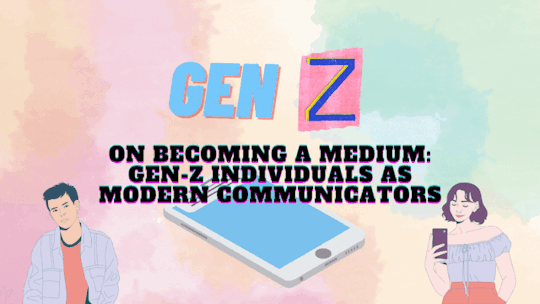
On becoming a medium: gen-z individuals as modern communicators
Generation Z, or Gen Z Like other generations, there are many factors that distinguish Zoomers, as they are commonly called. Most importantly, they are the first generation to grow up with access to the internet and digital technology, which has greatly influenced the way they interact with their environment. This change is evident in marketing. Because Zoomers have grown up with the Internet, their shopping habits are very different from other generations. Online shopping is nothing new to them and unlike other generations, they take it for granted.

If you’re struggling to connect with Gen Z, your marketing tactics might be considered cheugy.
Anything that is considered worn out, untrendy, or uncool is cheesy. This is just one example of how Gen Z has created an entirely new language and new ways of communicating with the world. By creating their own vocabulary, using emoji to express emotions, and avoiding outdated means of communication to feel more authentically connected, Gen Z is rapidly adapting their personal and professional communication methods. changing. It influences how brands communicate with their target audience.
This is just one example of how Gen Z has created an entirely new language and new ways of communicating with the world. By creating their own vocabulary, using emoji to express emotions, and avoiding outdated means of communication to feel more authentically connected, Gen Z is rapidly adapting their personal and professional communication methods.
As the first generation to grow up with a phone, Zoomers are not only used to being constantly connected, but they are also used to being hyper-adaptive, creative, and deeply aware of the world around them. Not only do they prefer informal forms of communication, like texting or direct messaging, but they also rely heavily on acronyms, emojis, and slang to convey meaning.
References: https://www.theodysseyonline.com/communication-generation https://brands.wattpad.com/insights/gen-z-communication
3 notes
·
View notes
Photo

“On Becoming a Medium: Gen-Z Individuals as Modern Communicators”
Although, Millennials are “the most reached generation”, comprehending Generation-Z is important to success in higher education. While post-Millennials shared some characteristics with previous generations, they are distinct in their wants and demands, particularly when it comes to communication.
Who is Generation Z?
The Group of people born between 1995-2012 are Generation-Z and colloquially also known as zoomers. The beginning birth years are the mid-to-late 1990s, and the ending birth years are in the early 2010s. Gen-Z is interested in constant connectivity, more ways to communicate (chat, text, social media, and in-app comments).
Gen-Z understands the influence they have over the new world and has no time to waste when it comes to communication. They prefer to talk straight to the point when it comes to communication. As of today, Gen-Z prefers web-based communication such as Messenger, Zoom, etc.

How Generation Z Communicates
When it comes to reaching this generation, perhaps one word comes to mind: in Instant. They are the first generation of digital natives, thus they are accustomed to information availability as well as immediacy.
According to WB Partnership Zoomers, the first generation to grow up with a phone is accustomed to not just being always connected, but also to being hyper-adaptable, innovative, and acutely aware of their surroundings. They do not only favor informal communication methods such as texting or direct messaging, but they also rely heavily on abbreviations, acronyms, emoticons, and slang to express meaning. For example, emoticons have become a standard feature of textual communication. Gen Z has already begun to develop its emoji language. A single finger emoji could indicate that you're pointing at something, however, two fingers pointing in the same direction could indicate that you're shy or embarrassed. The crying laughing emoji has been replaced by a skull or coffin emoji.
First and foremost everything written concisely is bound to catch their attention (Gen Z). The TL;DR (Too Long, Didn't Read) manner of communication is a Gen Z specialty. If you don't communicate with this generation directly and visually, you won't be able to keep their attention. You'll also lose them if your communication doesn't use inclusive language. (think: gender-neutral).

Because technology has been present since most Gen-Z-ers were children, they take these tools and 24/7 mobile access for granted. As a result, Gen-Z is frequently referred to as a generation of tech-savvy digital natives; and, while this isn’t always the case, being more tech-savvy than prior generations does have an impact on Gen-Z’s communication patterns. Being Tech Savvy refers to one’s ability that comprises more than just “knowing” how technology works; it also includes “utilizing” such current technologies to increase productivity and efficiency.
When Gen-Z people appear at work, they are casual, precise, and concise on the things that they do. We Generation Z may be perceived as lazy or uncaring since we do not inform older folks when we are happy. Because smartphones enable such massive amounts of interactive information to be created and shared, Gen-Z spends most of their time on their mobile devices, even spending as much as nine hours a day. According to Katya Chamma “The Internet is the great highway of modern communication, free and independent.” At work, Gen-Z values authenticity and honesty, and that they are influencing their coworkers.
References:
https://www.keystoneacademic.com/news/communicating-with-generation-z-everything-you-need-to-know?fbclid=IwAR37l-kwZ9UT_99uU0Dmm6IsS9scFTHZyCC46x3wCx9JDzNCEjb4krk_Bho
https://www.cleverism.com/skills-and-tools/technology-savvy/?fbclid=IwAR1gBOTnHXM08rCUSG0xqxVMtYhkSWA89pimFZl0iPH4a7AkfD1Fd17M8Ms
https://genhq.com/jason-dorsey-shares-insights-on-gen-z-with-forbes-africa/
10 notes
·
View notes
Text
Delivering News in the Present Age

Have you ever wondered whether the news you're watching on TV, listening on the radio, or reading on the internet is accurate and reliable?
When we look back at our old news media and compare it to our current media, we can clearly see how it evolved over time. In the past, the news was transmitted by word of mouth, which was later replaced by a written medium known as a newspaper. The use of a newspaper allowed news to travel a much greater distance. On the other hand, news delivery in the present has been modernized, which means that news is now distributed through mass media.
According to the publishers of RAND Corporation as society moved from "old" to "new" media, news content has generally shifted from more factual and objective event and context-based reporting to reporting that is more biased, relies more heavily on discussion and advocacy, and contains more emotional appeals.
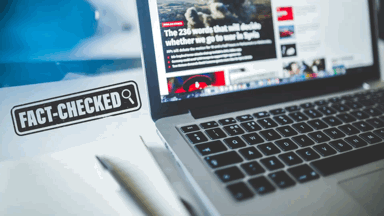
Delivering news in the present age change our ways to produce and receive various information. The way news is produced, transmitted, and perceived around the world has evolved tremendously as a result of technological advancements. More people use the internet to search for news than read a newspaper or wait for the evening news program. In a Statista 2021 survey, more over 70% of respondents from Kenya, South Africa, Malaysia, and the Philippines stated that they used social media as a source of news. The usage of technology in modern civilization has resulted in a world without borders. As a result, information sharing knows no bounds, allowing us to engage with a broader audience.
In this day and age, everything we need to know seems to be a click of a finger away. We've been exposed to a variety of information-containing materials, every single day. Despite the fact that the internet provides fast results, it also raises concerns about the accuracy, reliability, and validity of the information acquired.

The news headlines from all across the world can be alarming. They aim to elicit emotional responses from consumers. In an era when news spreads so quickly, it is often difficult to distinguish between what is real and what is false. Although there are some factors to take into consideration when searching for credible news on the internet, studying and understanding the media will aid you in finding a trustworthy source. While having so much information at our fingertips is terrific, it's critical to double-check sources and not trust headlines.

Combating and distinguishing false information is very vital not only to determine the factual information but the truth. We should be more responsible and careful on what we are reading online before sharing it to others. Nowadays, people tend to involve themselves in immediately believing in a certain type of article or news, without doing a fact-checking first. We should look for reliable sources of information and read the whole content comprehensively.
Not everything we see online is worth sharing. We should not be a victim, however we should help ourselves to know whether the type of news or article we are reading is accurate or not. In this way we can distinguish and disseminate an accurate information to every individual, because everyone has the right to know the truth. It is significant for us to participate in delivering high-quality and reliable information to all, and educating other people on how we check after receiving news in the modern times. That responsibility rests with all of us as we consider the future of providing high-quality, reliable, and factual information.
As the generation keeps on advancing forward, combating false information continues. Thus, it is crucial to be heedful of what you believe and share. We should remember that false information is harmful to our world, it makes the world less informed, and it erodes trust.
REFERENCES:
https://www.statista.com/statistics/718019/social-media-news-source/
https://www.rand.org/pubs/research_reports/RR2960.html
5 notes
·
View notes
Text
The Good And The Bad: What Can The Future Media Provide To The Next Generation?
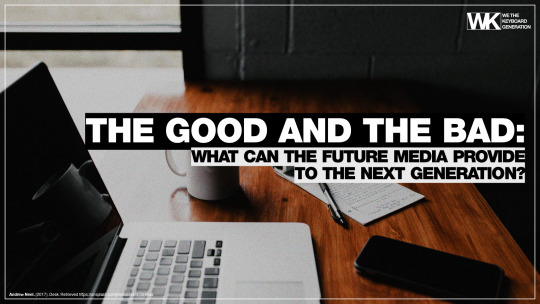
The Influence Of Media On The Future Generation
Media shapes our ever-evolving generations, continuously. Through the course of years, it is evident that most people find it useful in different areas of their concern. Media covers all means of communication, which people exchange, share and receive information for education, leisure, and exploration. Have you observed the difference between our current generation to those younger than us? These changes are proof of how influential the media can be. The new generation that was once inactive is now in the limelight of adapting and learning quickly. The advancing technology has helped people live in a connected world where communication and interaction from long distances and different time zones are possible. Young individuals are more exposed, aware, and informed of the issues that affect society, relevant events, and happenings across the globe. Innovation will be the constant equation considering the future of media. The future generation will wholly rely on media, making an immense impact on their lifestyles.
The Digital-Driven Development: Impact Of Pros And Cons
Nearly every element of modern life has been altered by digital technology. Travel, work, retail, entertainment, and communications are just a few of the domains that have seen a significant transformation in recent decades. It's becoming increasingly difficult to come across an electronic device or piece of machinery that doesn't use digital technology in some way. But what does it take to have a Digital-Driven Development
Society enjoys the benefits of digital transformation:
Social connectivity. Even if you are on the other side of the planet, digital technology allows you to stay in touch with friends, family, and work remotely.
Versatile working. The nature of work has changed as a result of technological advancements. As remote working grows more widespread, increased connectivity possibilities mean that many people now have significantly more opportunities to work from home.
Learning opportunities. Anyone with an internet connection now has access to a large percentage of the world's knowledge. Virtually delivered lessons and courses are now possible.
Automation. Machines are becoming increasingly intelligent as a result of digital technology. In some circumstances, people are no longer required to operate the machines, freeing staff to focus on more fascinating duties. In other circumstances, smarter machines imply higher safety standards or a better user experience.
Transportation. Many trains and planes already use digital technology to some extent. In the not-too-distant future, road vehicles such as cars and trucks will be totally automated.
Of course, a Digital-driven Development also has its downsides:
Data security. It is a major worry in today's digital environment. Because of digital technology, a massive amount of data (text, photos, and videos) is captured and stored. This information could belong to people or businesses who are at risk of identity theft.
Work overload. Daily, a considerable amount of data must be captured and processed, necessitating increased attention and concentration, resulting in distress and isolation.
Plagiarism and Copyright. The enforcement of copyright laws is difficult to achieve since the amount of information available on the internet is large, and tracking every piece of data is growing more difficult.
Diminishing job opportunities. Certain forms of work are now done by automated machines, but they were previously done by humans. More digital technology is being used in the workplace, which is lowering the chances of landing a job.
Social Isolation. They sometimes experience ambiguity and doubt as a result of their internet interactions. According to studies, many people suffer from depression and other mental illnesses as a result of a lack of real-life contact.
The Generation Alpha: Into The Ubiquitous Universe
The advances in technology that humanity has made throughout the twenty-first century are reshaping the earth and its inhabitants in both social and economic dimensions. New technologies define our pace of life and, to a certain extent, affect our personalities. Generation Alpha, the generation that will succeed Generation Z, is the ambition of this trend, as seen by the fact that they live through screens. Generation Alpha defines those who were born in 2010 who have fully developed in the digital world. The birth of Gen Alphas is just like the first iPad by Apple. Generation Alpha individuals rely on technology to help them discover the world. As a result, unlike past generations, they are less reliant on physical interaction with their peers. According to the Wired Consulting study Understanding Generation Alpha, "as technology advances, artificial intelligence or voice will become increasingly common methods of communication between humans and machines, as keyboards and screens give way to gesture-based interfaces and conversations between devices and humans."
Some factors shape the future of this generation:
Mobile devices. Smartphones and tablets directly shape Generation Alpha. According to studies, the population of young children owning devices is steadily growing among other different devices like tablets, ipads, computers, etc.
Virtual assistance. Data processing algorithms are a highly targeted habit market of this generation. Virtual assistants will not only be their guide but also be their literal caregivers of work. Since this generation is technological-driven, everything they do will be done with virtual help. The rise of such assistants like Alexa and Siri enables users to
Toys and other accessories. Toys with artificial intelligence that are perceived as pleasant and dependable broaden children's perceptions of what technology can achieve for them. As a result, wearables such as smartwatches or smart bands will become a part of their daily life in the future.
Conclusion
Digital transformation benefits businesses and other developments across industries by allowing them to upgrade legacy processes, expedite efficient workflows, boost security, and increase profitability.
2 notes
·
View notes
Text
"Unfolding the Bitter Truth: The Dark Side of Media and Technology"
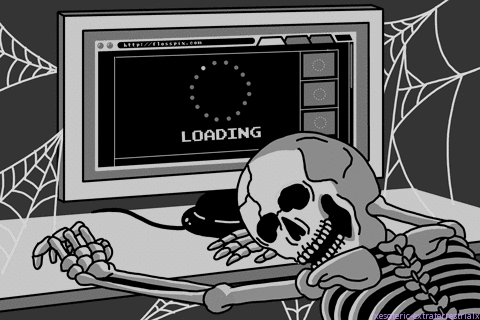
The world has changed because of digital technology. It is neither helpful nor dangerous by nature. The true consequences of technology are determined by how it is used. It has the ability to both inspire and catalyze change, as well as be utilized in ways that are harmful to society. In fact, technology has already become a fundamental part of our existence, and there is nothing we can do to eliminate it because it provides humanity with so much convenience. Today, we can observe a new relationship growing between humans and electronics. Without our trusty phones, computers, or tablets, it appears that most of us would be adrift in the world. The fundamental cause of this link is the progress of technology itself. The more technology advancements are created, the more we, as humans, are drawn to using them to make our lives easier. As a result, we are responsible for how much technology we are exposed to every day.
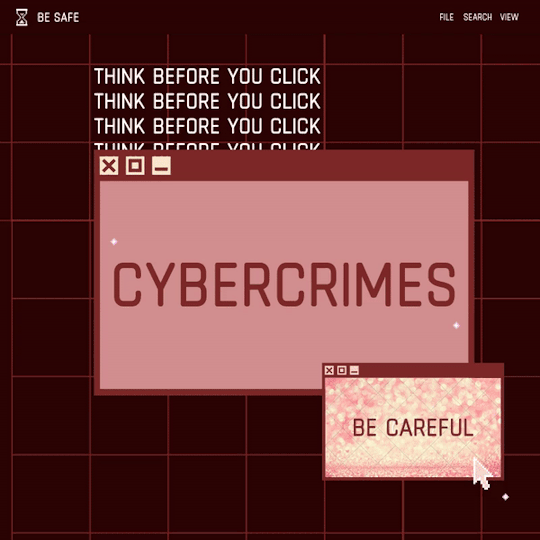
As the internet has grown in popularity, it has become an integral part of most people's everyday lives, and they would be unable to function or conduct their daily business or activities without it. It's incredible that we can now communicate and even see someone across the nation with only a few mouse clicks or a tap on our phone. People will always discover methods to exploit technology and utilize it with the goal of committing crimes, converting a positive instrument into a negative one, as technology advances and progresses seemingly for the better… But It also has some drawbacks in terms of the parallel advancement of negative technology usage. Malware is a set of instructions that has the capability of causing harm to any computer system or network. As a result, detecting malware, particularly novel malware, is a critical problem in today’s software security field. Traditional signature-based detection works effectively against known harmful programs but fails to detect new ones that lack signatures. Furthermore, techniques like code polymorphism and metamorphism, which malware writers use to obscure code, are typically seen as ineffectual using this approach.
Another kind of danger on the internet is something we tend to look over and underestimate. It is usually everywhere and takes the form of something enticing. This danger is what we call information, or more specifically, misinformation, disinformation, and “Fake news”. These dangers usually take the form of something very attention-grabbing such as stories about celebrities or more recently, news about the current pandemic and vaccines. These dangers not only implant lies and confusion among the masses, but also gives the people distrust to the media and could also harm a person because of the false information such as discredited sciences, implanted in their minds. These dangers are very vast and are all over the place, which is why scholars are still currently understanding it- such as how and how much it moves and also why people do believe these things. A lot of actions are currently being made to lessen and hopefully eliminate these dangers on the internet. Schools are currently teaching their students about media information literacy to help the students to look out for these kinds of dangers on the internet. Webinars and seminars are held to spread awareness about these dangers on the internet. However, despite all of these actions made, a number of people all over the world still need to be taught about how to have awareness of these kinds of dangers on the internet.
So is the internet bad for humanity?
The internet is a gift to humanity, however, coming along with its rise was the dangers that came along with it. The internet was made to help us, but dangers rose along within it. That is why we should all be careful about whatever we see and click on the internet. These dangers come in different forms and they all are mostly very enticing and convincing. These dangers presented may not be completely eliminated but they can be avoided. Researches are still ongoing to eliminate these types of dangers on the internet. Despite all the wondrous things that the internet has given us, we are not safe- which is why our current best weapon to defend ourselves is to be cautious and be literate of these ongoing problems.
Digital technology has provided us with comforts and conveniences that were nearly impossible merely a generation ago. People have taken advantage of the vast opportunities and freedom that the media has offered everyone, resulting in misuse and misinformation. The influence of social media platforms has shaped public opinion which concerns people with the issues arising in the media. There were concerned issues about Cyberbulling and Internet pornography. There are also others who are concerned about their privacy when digital trails like phone calls, email messages, and other data they have inputted on the internet can be exploited.
References: https://epthinktank.eu/2019/02/18/how-the-internet-can-harm-us-and-what-can-we-do-about-it/
https://www.techtarget.com/searchsecurity/definition/cybercrime#:~:text=Cybercrime%20is%20any%20criminal%20activity,networked%20device%20or%20a%20network.&text=Some%20cybercrimes%20do%20both%20%2D%2D,effect%20of%20cybercrime%20is%20financial.
https://www.cram.com/essay/Malware-Essay/F3X2SFHLCXXW
https://edu.gcfglobal.org/en/digital-media-literacy/what-is-fake-news/1/
https://guides.lib.uw.edu/c.php?g=345925&p=7772376
https://libguides.exeter.ac.uk/fakenews/consequences
https://journalistsresource.org/politics-and-government/fake-news-conspiracy-theories-journalism-research/
https://www.imf.org/external/pubs/ft/fandd/2016/09/wellisz.htm
2 notes
·
View notes
Photo






E-PORTFOLIO: BLOG ENTRY #2
1 note
·
View note
Text

“Media Evolution and the Changing World”
The world has already and continuously disseminating information about a certain topic from one place to another, using the existence and the availability of technology nowadays. The evolution of media has helped to acknowledge people from ages and up to the present, and thus, traditional media is still widely used in this modern world. Medias revolve around us as it makes us convey and receive information less than in a minute. In fact, we do it easier today. Not just that, this also allows people to let you experience things that were restricted the past few years. In this modern world, technology has to keep everything up to the next level, making it easier and faster to work with less effort. Thus, aside from the advanced technology that we have today, the traditional way of media has never been forgotten and still plays a big important role in our present, bringing benefits to everyone’s lives.

The media widened the people's minds to think beyond their personal views. These media, specifically the internet-based website are embedded in the day-to-day lives of the people. Not just that, this also allows people to let you experience things that were restricted the past few years.
The old media is a more traditional style of communication through television, radio, newspapers, magazines, and books, while new media is interactive and user-generated. People usually used to write letters to communicate with people who lived far away and it normally takes several months for them to receive it. Things in the world are continually being upgraded as time passes, and one of these is the evolution of media. Empirically, new media makes everything easier for us, including the use of accessible media, yet it causes the majority of people to depend on it. There's nothing wrong with simplicity but the problem is the existence when individuals become overly reliant on it because people's behavior in the new media has led to the majority of them engaging in malevolent behavior and lies. Some of those posts may contain offensive images many of the users have become more cautious of one other's viewpoints and that made the traditional media feel better to communicate with people.

The Internet has clearly impacted our lives to the point that it has changed a lot of things, like the way we interact with our family, friends, and others. Now, this makes everything convenient and accessible that it closed the gap between poor, middle, and high class. Let's not forget that evolution also impacted all levels of education by providing unbounded possibilities for learning. People can now use the web to make and share knowledge and develop new ways of teaching and learning that captivate and stimulate students’ imagination at any time, anywhere, using any devices. By connecting and empowering students and educators, we are able to speed up the economic processes and enhance the well-being of society throughout the world. The media evolution is changing the world, specifically our society.
The evolution of media doesn’t only help people to easily connect with each other but also helps the people to be updated and aware of the societal issues that are happening in the world. Social media is helping us to better respond to disasters, for this greatly influences the ability of the people to help individuals who are affected by natural catastrophes such as typhoons and earthquakes. With the help of these media platforms from people across the world are able to know the occurrence of political issues from other countries. Social media has become the gateway for society to change for it gives people an opportunity to recognize issues and become fully aware and responsible. Morever, this given platforms is helping us to tackle some of the world’s biggest challenges, from human rights violations to climate change.
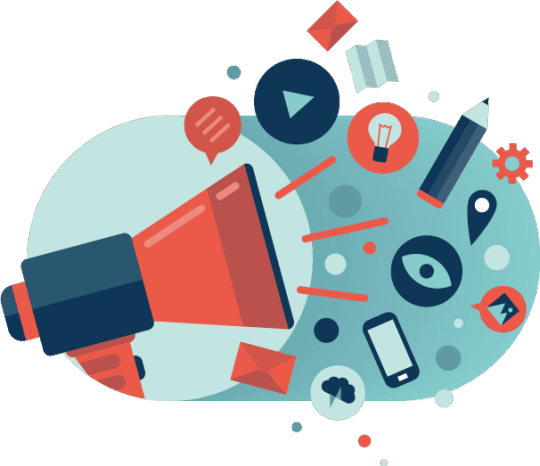
We witnessed from the past generation how people are having a hard time talking about certain issues and due to the fact that they were forced to silent their mouths because if not a big consequence is waiting ahead of them. Whereas in this time and with the helpthese media tools, this allow people on understanding things more. Letting their minds grasp a piece of information. They are turning every platforms they can get into an educational platform that they were deprived of. Equally important to this statement is the the idea that this will help the future better and hopefully use this in a way that will not just benefit only themselves but also the people around them. We should always work together to make a worldwide learning society that will all help us in our coming future.
To sum up everything that has been stated, as the Media keeps evolving and revolves around us, this is to remind us to stay attentive and be aware of what is happening today. This is for us to hear and raise our voices as a response to the information we received, and to take actions that the world needs.

1 note
·
View note
Text
Delivering News in the Present Age
Everything in our surroundings and everywhere we go, anything could be happening in any second or any moment. With such things happening, most people, especially those people on the internet tend to be really updated on what's going on around the world. Mostly teens and netizens (net citizens) are the ones getting these news quickly.
Delivering news had so many different ways, especially in the old times. Gladly, our ways have changed, and had kept changing as time keeps moving forward.
These days, some news are being delivered and and we can see or hear in any social media platform, the web, in television, or even in newspapers. But back in the old times, it was only on newpapers and those old, cheap televisions, or even those old radios were the only devices and ways were used for the people to get the informations and news on what's been going on around them or elsewhere.
Although, there are some process of collecting or gathering informations and delivering of news that did not really quite change. Journalists and news sharers/newscasters existed before, until nowadays as well. Different times, different people, but still had the same job and things on what to do just to deliver the news and spread the containing information to the people.
Nowadays, since majority of the people have the internet and things are way more into high-technology, getting the news have been way a lot easier than just riding a bike and throwing off newspapers in every doorstep in the neighborhood.
With such improvements like these from time to time, spreading the news have become less complicated as to many people are able to get the informations from the news quickly, becoming more aware of the situations in wherever places and in easier ways.
Since we are all living in this century and so forth, even witn a lot of improvements and such, a lot of situations still happening within us and of course, a lot of news have been occuring in our phone and television screens that we do not really expect to witness.
1 note
·
View note
Text
"Media Evolution and the Changing World"

Blog #2
Media is a method of transmitting data from a communicator to information collectors. It has become a crucial aspect of human nature that permits people to thrive and survive in today's hustle world. As time passes, numerous eras have come and gone, and so have the evolution of media. In the past, information was shared down through word of mouth or messages scrawled on stone tablets and the Egyptian papyrus platform. The messenger in the 17th century, who was part of the media, accomplished this by riding a horse to the recipient's location. Letters had been developed to aid in this procedure. People with prior experience in message delivery were employed to deliver letters in various areas.
The media in the past merely disseminated information to others via newspapers, radios, and other tangible objects. They communicate by writing and sending long-distance letters that can take weeks, or even months, to arrive. However, the media is gradually developing, making people's lives considerably easier, particularly in the realm of communication. The development of Homo sapiens approximately a hundred thousand years ago is a suitable reference point for a discussion of technologically advanced humans in the 21st century.
TRIBAL AGE
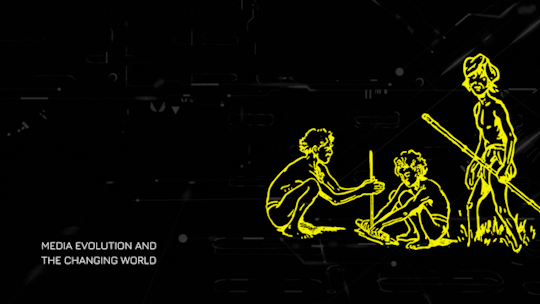
This is the period wherein people only utilized hand tools with no machinery. They depended on their sense of hearing, touch, and smell. Hearing, rather than seeing, aided conceptualization in this period as it enabled them to become more aware of their surroundings. This is crucial in the tribal age since these senses help detect what the naked eye cannot see. During this time, rocks or sticks are being used as a medium for them to communicate.
PRE-INDUSTRIAL AGE
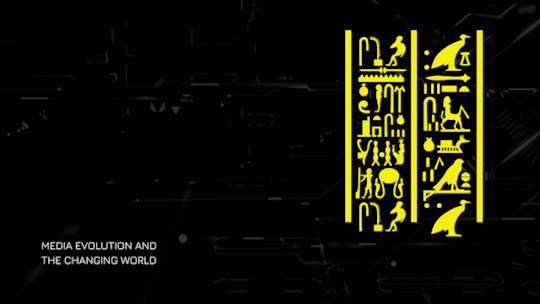
After years, the first period, which we refer to as the tribal age, was succeeded by the pre-industrial age. From being a period with an acoustic environment where the senses of hearing, touch, and smell were developed, to becoming the first period to be seen with evidence that the earliest civilizations had already refined the abilities to communicate information through writing and drawing. This is the period wherein the evolution of media has started. People came up with innovative ways to enhance their means of communication.
INDUSTRIAL AGE
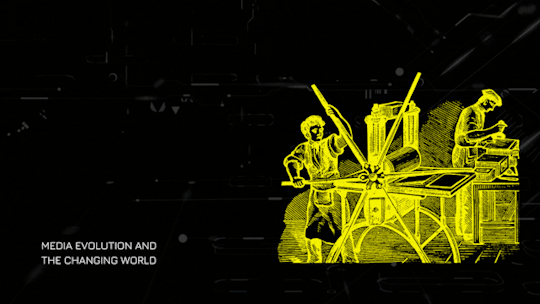
The pre-industrial age has given way to the industrial age. This is the period wherein the birth of machines took place, which also indicates having new materials to utilize in terms of communication. Media has been progressed at a different pace. The printing press, typewriters, telegraphs, telephones, and cameras were all invented during this period. This paved the way for the media to be more well known to people.
ELECTRONIC AGE
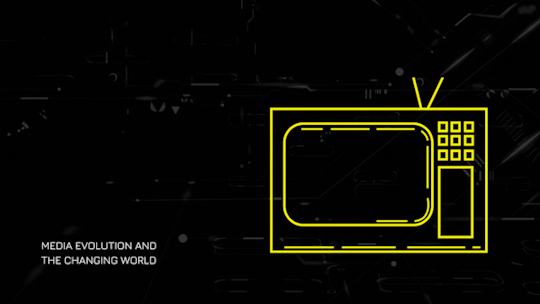
The industrial age has given way to the electronic age. This is the period wherein more advanced inventions were created. It paved the way for the development of electronic devices. As a result, mass media arose, allowing news to be disseminated in real-time.
INFORMATION AGE
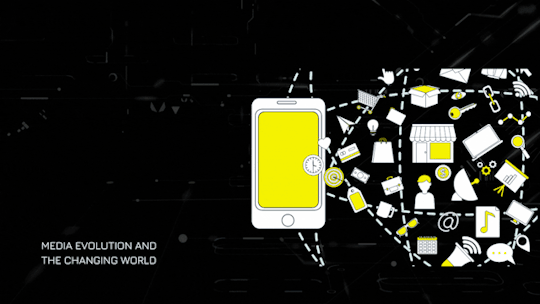
Finally, the information age has overtaken the electronic age. This is the period wherein the use of media has widely evolved. Various social media platforms were introduced due to the internet. The public now has the power to regulate the media. They are given the opportunity to express themselves and share whatever they desire. With the aid of modern technologies and internet connections, media use has become more widespread in recent years. Thus, allowing information to be disseminated in an immediate manner.
The progression of each period with the passage of time is evident. Each period is distinct because they possess unique characteristics. The evolution of media has created an impact on not only the world's progress but also the lives of countless people. They are introduced to a wide range of viewpoints that shape their perspectives and experiences of the social world. Given the power of limitless information from the internet, current events are no longer limited to print media, radio, and television. A lot of inventions have been created, and the means of communication are constantly evolving as well.
The information age will eventually come to an end. The world has revolutionized as a result of the internet, and people from all over the world may now communicate with one another. Therefore, it's worth noting that, as the world evolves, there will always be another period succeeding a certain period. In comparison to previous times, one may infer that the following periods will be more sophisticated. Thanks to the modernization of high-tech products and platforms, the current generation is the most technologically literate in history. However, if the historical pattern of advancements is taken into account, future generations are anticipated to be more technologically knowledgeable, with a higher ability to develop their expertise, comprehension, and awareness of certain matters.
All of us are exposed to the world’s dilemma of change. Evolving is equivalent to changing. It may take place in a wide variety of ways, and it is dealt with in a variety of ways as well. In this world, everything is dynamic and adaptive. As they say, the only thing that remains constant is change. But one thing is certain: we must never lose sight of the essentiality in the acceptance of change, for it is inevitable.
3 notes
·
View notes
Text
Delivering News in the Present Age
According to the publishers of RAND Corporation as society moved from "old" to "new" media, news content has generally shifted from more-objective event and context-based reporting that is more subjective, relies more heavily on argumentation and advocacy, and includes more emotional appeals. These changes were observed across platforms, appearing least significant in the evolution of print journalism and most stark in comparisons of broadcast news with prime-time cable programming and of print journalism with online journalism. The changes in our news media have captivated not only us individuals but along with the innovation of our technologies. Back in the early 1900’s the totality of our technology was quite minimal. In fact, only those people who have a privilege can be able to access the radio or the television.
Newspapers, broadcasting, journalism, media, and magazines are forms of the news industry. It focuses on delivering news to the people or in the public. As a matter of fact, the daily media news has been influenced by our society’s new or modern culture. However, broadcasting or delivering news has been increasing because of social media and a lot of independent news sources have evolved to deliver on certainties or events that haven't been observed in the mass media. As News evolves, it created a field of branches that consisted of:
Newspapers
Broadcasting
Journalism
Media
Magazines
Delivering news nowadays needs to be more factual, credible, and unbiased in order for us people to determine that these types of news are the right information given to the public. Journalists, news writers, reporters etc. should filter truth and authentic news that has evidence to back them up before spreading it on the mass media and to the public. False information is also very rampant in the Present Age. It is because people are spreading misleading and inaccurate information in the public that makes a lot of people misunderstand and misjudge these types of news. For example, a page in Facebook named “Einquirer Net” is trying to copy the popular leading Philippine news and information website (Inquirer Net) is posting a lot of false information in the mass media that made thousands of people misunderstand and misjudge it. Individuals nowadays should also be more responsible and careful on what they are reading online before sharing it to others. We individuals tend to involve ourselves in immediately believing in a certain type of article or news. It shouldn't be practiced like that. We individuals should help ourselves to know whether the type of news or article we are reading is accurate or not. In this manner, we can differentiate and disseminate the information that is accurate to every individual for them to know what is right and wrong because every person has the right to know the truth.
As time passed, and the cost of new gathering surged, publications struggled upon keeping up with what appeared to be fostered for printed news. Gradually, news agencies took the place of independent publishers. Thus, they would acquire people to engage and write reports, which they would be able to sell through various individual news outlets. Although, print media was about to face off against a whole form of news grouping. According to Sanjay Pugalia, The aggressive digital evolution of this generation has made data one of the most valuable commodities in existence today. The ability to strike a careful balance between transparency, privacy, and security, while utilizing the immense potential of data and technology, assisted by intelligent innovation, is what will set apart a news organization in this brilliant new age of possibilities.

1 note
·
View note